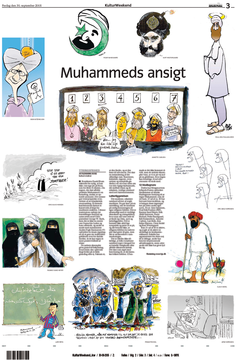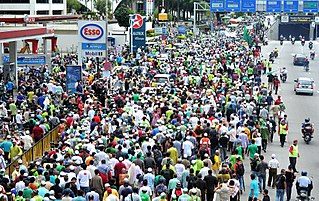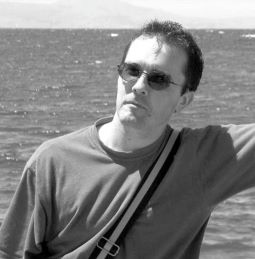Blasphemy refers to an insult that shows contempt, disrespect or lack of reverence concerning a deity, an object considered sacred, or something considered inviolable. Some religions regard blasphemy as a crime, including insulting the Islamic prophet Muhammad in Islam, speaking the sacred name in Judaism, and blasphemy of the Holy Spirit is an eternal sin in Christianity. It was also a crime under English common law.

Quran desecration is the treatment of the Quran in a way that might be considered insulting.
Charlie Hebdo is a French satirical weekly magazine, featuring cartoons, reports, polemics, and jokes. The publication has been described as anti-racist, sceptical, secular, libertarian and within the tradition of left-wing radicalism, publishing articles about the far-right, religion, politics and culture.

Flemming Rose is a Danish journalist, author and Senior Fellow at the Cato Institute. He previously served as foreign affairs editor at the Danish newspaper Jyllands-Posten. As culture editor of the same newspaper, he was principally responsible for the September 2005 publication of the cartoons that initiated the Jyllands-Posten Muhammad cartoons controversy early the next year, and since then he has been an international advocate of the freedom of speech.
The Jyllands-Posten Muhammad cartoons were first published by Jyllands-Posten in late September 2005; approximately two weeks later, nearly 3,500 people demonstrated peacefully in Copenhagen. In November, several European newspapers re-published the images, triggering more protests.
This page collects opinions, other than those of governments or inter-governmental organizations, on the Jyllands-Posten Muhammad cartoons controversy. For an overview, and details on the controversy please see the main page.
The 2006 Islamist demonstration outside the Embassy of Denmark in London took place on 3 February 2006, in response to controversy surrounding the publication of editorial cartoons depicting the Islamic prophet Muhammad in the Danish newspaper Jyllands-Posten on 30 September 2005. The extremist UK-based Islamist groups al Ghurabaa and The Saviour Sect staged a controversial protest march from London Central Mosque near Marylebone Station to the Danish Embassy near Knightsbridge Underground station.

The Jyllands-Posten Muhammad cartoons controversy began after the Danish newspaper Jyllands-Posten published 12 editorial cartoons on 30 September 2005, most of which depicted Muhammad, a principal figure of the religion of Islam. The newspaper announced that this was an attempt to contribute to the debate about criticism of Islam and self-censorship. Muslim groups in Denmark complained, and the issue eventually led to protests around the world, including violence and riots in some Muslim countries.

In Islam, blasphemy is impious utterance or action concerning God, but is broader than in normal English usage, including not only the mocking or vilifying of attributes of Islam but denying any of the fundamental beliefs of the religion. Examples include denying that the Quran was divinely revealed, the Prophethood of one of the Islamic prophets, insulting an angel, or maintaining God had a son.

In mid-June 2007, Salman Rushdie, the British-Indian novelist and author of the novel The Satanic Verses, was created a Knight Bachelor by Queen Elizabeth II. Soon after the news of the knighthood was released protests against the honour were held in Malaysia and in Pakistan where effigies of the writer were publicly burnt. On 19 June 2007, governments in both Pakistan and Iran summoned their British ambassadors to officially protest against the award. While many groups and individuals have renewed the call to execute Rushdie, the author "is not commenting on the latest threats to his life. It is understood he is anxious not to inflame the situation". When asked by the Associated Press if his silence was at the request of the British government, Rushdie replied by e-mail stating "The British authorities have not asked me to do or not do anything. I have simply chosen to remain out of this storm for the moment. And nobody is turning anything down." The media noted in July 2007 that Rushdie "has not been seen in public since the 16 June announcement of his knighthood." However, he was photographed receiving his knighthood formally the next year at a ceremony which, breaking with tradition, was not announced in advance of his attendance.

The Lars Vilks Muhammad drawings controversy began in July 2007 with a series of drawings by Swedish artist Lars Vilks that depicted the Islamic prophet Muhammad as a roundabout dog. Several art galleries in Sweden declined to show the drawings, citing security concerns and fear of violence. The controversy gained international attention after the Örebro-based regional newspaper Nerikes Allehanda published one of the drawings on 18 August as part of an editorial on self-censorship and freedom of religion.
The international reaction to Fitna consisted of condemnation from Muslims, several fatwa against Geert Wilders, and attempts by many Islamic countries to censor the film. The Dutch government immediately distanced itself from the film. Several Muslim organizations and political parties organized boycotts against Dutch products.

The permissibility of depictions of Muhammad in Islam has been a contentious issue. Oral and written descriptions of Muhammad are readily accepted by all traditions of Islam, but there is disagreement about visual depictions. The Quran does not explicitly or implicitly forbid images of Muhammad. The ahadith present an ambiguous picture, but there are a few that have explicitly prohibited Muslims from creating visual depictions of human figures. It is agreed on all sides that there is no authentic visual tradition as to the appearance of Muhammad, although there are early legends of portraits of him, and written physical descriptions whose authenticity is often accepted.

Everybody Draw Mohammed Day was a 2010 event in support of artists threatened with violence for drawing representations of the Islamic prophet Muhammad. It stemmed from a protest against censorship of the American television show South Park episode "201", led by the show's distributor Comedy Central, in response to death threats that had been made against some of those responsible for two segments broadcast in April 2010. A drawing representing Muhammad was posted on the Internet on April 20, 2010, with a message suggesting that "everybody" create a drawing depicting Muhammad on May 20 in support of free speech.

Islamic teachings and argument have been used to censor opinions and writings throughout history, up to and including the modern era, and thus there are many cases of censorship in Islamic societies. One example is the fatwa against The Satanic Verses, ordering that the author be executed for blasphemy. Depictions of Muhammad have inspired considerable controversy and censorship. Some Islamic societies have religious police, who enforce the application of Islamic Sharia law.

The release of the anti-Islamic short film Innocence of Muslims triggered numerous demonstrations across North Africa, the Middle East and South Asia. On September 11, 2012, dozens of protestors scaled the walls and entered the courtyard of the U.S. embassy in Cairo, Egypt. On September 13, 2012, protests occurred at the U.S. embassy in Sana'a, Yemen, resulting in the deaths of four protesters and injuries to thirty-five protesters and guards. On September 14, the U.S. consulate in Chennai was attacked, resulting in injuries to twenty-five protesters. Protesters in Tunis, Tunisia, climbed the U.S. embassy walls and set trees on fire. At least four people were killed and forty-six injured during protests in Tunis on September 15. Further protests were held at U.S. diplomatic missions and other locations in the days following the initial attacks. Related protests and attacks resulted in numerous deaths and injuries across the Middle East, Africa, Pakistan, and Afghanistan.

On 7 January 2015, at about 11:30 a.m. in Paris, France, the employees of the French satirical weekly magazine Charlie Hebdo were targeted in a terrorist shooting attack by two French-born Algerian Muslim brothers, Saïd Kouachi and Chérif Kouachi. Armed with rifles and other weapons, the duo murdered 12 people and injured 11 others; they identified themselves as members of al-Qaeda in the Arabian Peninsula, which claimed responsibility for the attack. They fled after the shooting, triggering a manhunt, and were killed by the GIGN on 9 January. The Kouachi brothers' attack was followed by several related Islamist terrorist attacks across the Île-de-France between 7 and 9 January 2015, including the Hypercacher kosher supermarket siege, in which a French-born Malian Muslim took hostages and murdered four people before being killed by French commandos.

Charlie Hebdo issue No. 1178 was published on 14 January 2015. It was the first issue after the Charlie Hebdo shooting on 7 January 2015, in which terrorists Saïd and Chérif Kouachi killed twelve people. The edition was put together by surviving Charlie Hebdo cartoonists, journalists, and former contributors and was prepared in a room in the offices of Libération. The issue's print run of 7.95 million copies became a record for the French press. The publication sparked protests by Muslim demonstrators in Yemen, Pakistan, Mauritania, Algeria, Mali, Senegal, Niger, Chechnya, and other countries. In Niger, violent protests led to 10 deaths.

On 16 October 2020, Samuel Paty, a French secondary school teacher, was attacked and killed in Éragny-sur-Oise, Île-de-France, France, by an Islamic terrorist.












